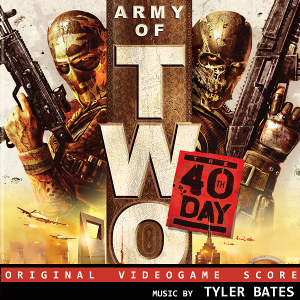Army of Two -The 40th Day- Original Videogame Score
 |
Album Title: Army of Two -The 40th Day- Original Videogame Score |
| Record Label: Electronic Arts |
|
| Catalog No.: N/A |
|
| Release Date: January 5, 2010 |
|
| Purchase: Download at iTunes |
Overview
EA Montreal’s cooperative shooter Army of Two: The 40th Day featured a number of changes compared to the original game. One of these was the original score, which was scored by Tyler Bates rather than Trevor Morris. Bates is a veteran of the film music industry, who made his video game debut on Rise of the Argonauts. His second game soundtrack isn’t particularly original, but is a mature and fitting complement to the game…
Body
The soundtrack begins with the primary theme for the game, “Introduction”. In a shift from the original Army of Two, Bates focuses on conveying the intensity of the scenario using orchestral rather than electronic elements. The brass-based main melody blends an anthemic quality with a considerable Spanish influence, probably to pay tribute to the game’s macho Mexican protagonists Salem and Rios. An intense string basso ostinato drives the track throughout, while experimental sound design dominates the treble to reflect the dangerous environments, right up to the chilling fast-paced climax. The final track isn’t quite as original or impacting than its equivalent from Army of Two, though it still befits the scenario and provides a memorable listen.
Since the soundtrack is for a modern shooter, there are plenty of thrilling action tracks featured throughout the release. On “High Rise”, Bates reprises the heroic theme from “Introduction” in a contrasting environment. The percussion is particularly prominent here and complements the urban setting. The percussive focus is even stronger on “Cages”, to portray the neverending wave of enemies within an insane firefight. The melody of “Vertigo”, in contrast, creates a Middle Eastern feeling with its distinctive string-focused soundscapes. The final track is one of the most thrilling on the stand-alone soundtrack, although it adheres too strongly to action movie tradition to be particularly special.
In contrast to the original game, the most notable aspect of the soundtrack are the numerous cinematic tracks. For example, “What Else Could Go Wrong” uses a standard orchestral palette to indicate a sense of impending disaster, while “Embassy” uses many ominous instruments and choral elements to introduce a dominant organisation. Tracks such as “Can Your Contact Hear Me” maintains a distinction with its focus on Chinese instruments, further describing Shanghai’s struggle, while “Bossa China” also emphasises these regional characteristics. Many of these tracks are too short and derivative to be worth stand-alone listening. However, they complement the game’s cues with the quality and potency of a blockbuster movie, so exceed expectations in context.
Moving to the conclusion of the experience, “Back to Back” evolves from a slow string-rich intorudction into an adrenaline-pumping bass-driven track. Among the more expansive tracks on the soundtrack, it definitely encompasses the raw nature of the game well and describes the dual protagonists’ military prowess. “Bund” is the score’s final track and also its most outstanding. It recapitulates the main theme for the game within an action-packed five minute orchestration. Once again, for better or worse, it has the stylistic qualities and production values of Bates’ primary focus, movie scores. It’s a fitting way to round off the album both stylistically and thematically.
Summary
Tyler Bates created a considerably different score for Army of Two: The 40th Day to his predecessor. The most impressive feature of these tracks is how they related to the game perfect to portray its broken urban environments and describe Shanghai’s downfall. Their worth on a stand-alone basis is considerably lower, due to the brief and stereotypical nature of many tracks. However, those who enjoy blockbuster action movie scores should fine themselves in familiar territory here and may wish to consider purchasing this digital release.
Do you agree with the review and score? Let us know in the comments below!
3.5
Posted on August 1, 2012 by Harris Iqbal. Last modified on January 22, 2016.














